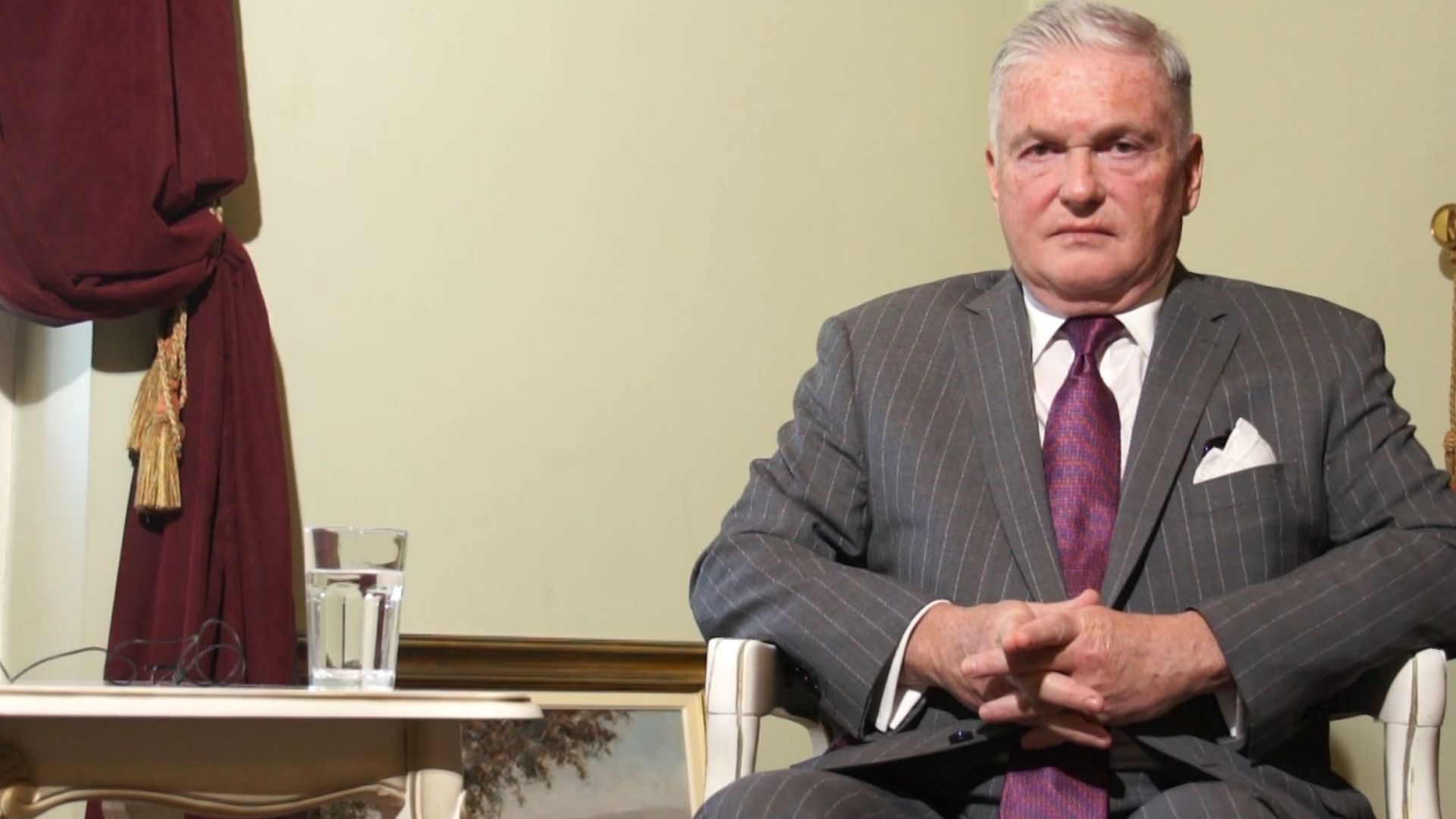The conservative philosophy which I have developed in my writings and which I have attempted from time to time to advocate in the public sphere is a very English philosophy. It is marked by the experiences of my youth. I grew up in a country which had won a war against a dangerous adversary, and in the course of doing so had lost its dominant position in the world. The England of my youth enjoyed a memory of empire, and possessed a few surviving colonies, which it hastened to jettison, however, since they were an economic and political cost. Our core institutions – monarchy, Parliament, the common law, the ancient universities and schools, the Anglican and non-conformist churches, the great Victorian charities – had survived the war more or less intact, and there was still a residual belief in them, although not among left-wing intellectuals, who on the whole were given to sneering at the hierarchies, privileges and class-distinctions which they identified as the social and political heart of old England.
Our situation after the war was therefore nothing like that of Romania, which had fallen victim to successive acts of aggression, and had lost what little independence it had enjoyed in the pre-war years. Little remained of the legal order that had come down from the old Hungarian settlement, and everything was for most of the post-war period, until the fall of Ceausescu and may
| Roger Scruton | Pornography and the Courts (februarie 2009) |
be a bit beyond that too, in the hands of the communist mafia. It is not to be supposed that a conservative philosophy shaped to meet the needs of modern England can be simply transferred to Romania or that it will deliver solutions to Romanian problems. Indeed, it is a feature of conservatism that it does not claim an internationalist goal or universal purpose. It is a local attempt to defend a local inheritance. And its concerns and methods vary from country to country, in response to historical experiences which may have little or nothing in common. In this, of course, it differs from both socialism, with its comprehensive and trans-national goal of social equality and economic justice, and what is usually called ‘classical’ liberalism, with its universal philosophy of individual freedom and human rights.
This lack of a universal agenda is one of the weaknesses of conservative politics in our time. It is the reason why centre-right parties find it so difficult to combine in the European Parliament in opposition to the left-liberal agenda of the European machine. It is the reason why, in their well-meaning attempts to form an international front against the socialist superstate, centre-right policians tend to advocate ‘human rights’. Their intention is to secure economic and social freedoms. But they do so by giving a hostage to fortune that is soon seized by their opponents. By making social equality and ‘non-discrimination’ into human rights left-liberal activists have found an easy way to advance their agenda, under the banner of impeccable-seeming liberal ideals.
In addressing you today, therefore, I am conscious of the great differences between the Romanian and the British experience in recent times, and the difficulty of translating into your situation the doctrines and devices that have arisen from our own problems and conflicts. At the same time, while conservatism is marked by the place and time in which it is formulated, there is an underlying vision of human nature which all conservatives share, and which needs to be made explicit at a time like this, when our societies are entering periods of rapid and radical change. It is easy to lose sight of this vision, and to take refuge in short-term policies and compromises which serve to postpone for a while the painful confrontation with the left. But that confrontation cannot be postponed indefinitely, and conservatives must work on ways of winning it, rather than retreating from it.
The temptation to retreat can be clearly understood from the present economic crisis, in which the Americans have adopted policies congenial to the left. These policies will certainly lead to a massive growth in the state, and a further stifling of the private enterprise needed to activate the economy. And the American initiative is being followed everywhere. You can see how it happens, and the American example is instructive. A particular industry, like the motor industry in America, becomes successful and expands. Trade unions use their power to claim privileges which burden the industry with expenses that it cannot easily meet. But easy credit ensures that the product can be sold sold, Americans being for the most part happier with a General Motors car than with a cheap import from Japan. Suddenly easy credit ceases. For people are only as reliable as their jobs and their virtues. All credit depends upon trust in those things, and will vanish when trust vanishes. The result is a sudden failure of the motor industry.
A conservative response to this situation is to say that it was irresponsible of the motor industry to depend on credit purchases; it was irresponsible to build, on the frail foundation of other people’s promises, an industry which depends upon the continual production of luxury goods. It was particularly irresponsible to build the business in this way, in the face of competition from others who produce cars for a more reliable and less heavily mortgaged market. And it was also irresponsible to give way to union demands for shorter working hours, higher salaries, and elaborate pension rights, at a time when the industry was facing aggressive competition from abroad. If people behave irresponsibly, conservatives believe, then they should bear the cost of their actions. This is a fundamental moral intuition on which much of conservative thinking depends. If there is a single thing wrong with both the socialist and the liberal visions of modern societies, is that they both involve a massive transfer of costs, from the one who causes them, to whoever might be found to pay for them.
The conservative response to the crisis in the American motor industry would therefore have been based on the premise that the industry itself must accept responsibility for its actions. It has pursued a course of action which inevitably led to failure: and it now should do what it can to rescue its assets and start again. The problem is, of course, that the industry had so wound itself in to the American economy that no government could easily accept the social and political costs of its failure. The loss of jobs, the transfer of populations, the damage to the manufacturing base – all these would be, in the short term, extremely painful. Hence the government agreed to an emergency grant of credit, of a sum equivalent to the GDP of many a poorer country, in order to maintain in being an industry which had shown itself to be incapable of surviving on its own.
Now this policy can be described in two ways. Someone influenced by the theories of J.M. Keynes would describe it as ‘stimulating’ demand. The economy will move forward to a new point of equilibrium, as once again the supply of cars is met by a sufficient demand for them, and those engaged in producing cars can continue in their jobs. Someone influenced by the free mrket theories of von Mises and Hayek would describe the policy in another way, as one of investing in a failing industry. He will point out that the American motor industry has failed to adapt to competition and to consumer budgets, and that by making massive credit available to it, the US government simply perpetuates its woes. By allowing the industry to fail, by contrast, the government would not only place the cost of failure on those who had produced it. It would also release from a dying industry a large number of skilled workers and managers who, forced to find another way of earning a living, would inevitably stimulate the economy in new and more viable ways. As it is, a large section of America’s most valuable asset (its human capital) is tied up in a dying industry.
To allow a great industry like the US motor industry to fail would of course involve a large short-term cost, in terms of social disruption and widespread harship. But conservatives believe that this short-term cost would be offset by a long-term benefit, and that the attempt to prevent it would merely postpone a problem that it would be better to confront now, with our will and resourcefulness intact, than at some future moment when everybody concerned has become habituated to state subsidies.
Now there are two reasons which might persuade a government to adopt the Keynesian strategy. One is a desire for an increase in the size and the power of the state. Without nationalising the motor industry, the government effectively makes it into a feofdom of the state, dependent on the state for subsidies, and obedient therefore to the will of the state. Of course the taxpayer will eventually have to pay for this: but the taxpayer will be asked to pay later, when the ‘stimulus package’ is a fait accompli. So the government can increase its power now without any electoral cost.
The second reason for following the Keynesian strategy is that it looks like a solution – and indeed it is a solution in the short-term. Moreover, as Keynes famously said, ‘in the long run we are all dead’: in other words, if we can postpone the day of reckoning for long enough, we will be off the hook. Such an argument has an irrestible appeal to politicians. It tells them that they can reward the irresponsible behaviour of powerful citizens, and remain securely in office. With any luck they won’t be around when the price must be paid.
There are certain general principles suggested by the example. First, there is the principle that states have a tendency to invest in failure. The experience of communism has probably brought this principle home to you. One of the most interesting features of communist economies was the absence of a law of bankruptcy, or procedures for compelling loss-making industries to shut down. A system of ‘economic arbitrage’ operated, to ensure that all existing industries were maintained in being by fictitious economic transfers, even if their sales were non-existent. This meant that the state never had to face problems of mass unemployment, nor did workers have either the incentive or the possibility to transfer to some other, more interesting or more lucrative job. The principal motor of any large economy – human enterprise – remained stalled within the system. And meanwhile the state itself was investing all its resources in subsidising industries without products, or industries with products for which there was no real demand and which were, in real economic terms, failing or bankrupt.
Yet the logic of the Keynesian approach to the credit crisis is precisely the same: to invest in industries which are failing, and because they are failing. The interest of the parallel lies partly in what we know from communism: namely that – even leaving aside the destruction of enterprise and the loss of initiative in every aspect of the economy – the resulting economy, founded on short-term solutions to short-term emergencies, did not succeed in postponing the long-term cost. Rapidly things wound down, to the point where chronic shortages of everything useful, and a chronic abundance of everything useless, effectively brought production to a stop. It seemed that we were all dead in the medium run, and without the hope of handing on the problem to future generations. I guess that this lesson, learned here in Romania the hard way, does not need reinforcing.
Secondly, the industries that are queuing up for subsidies in the present crisis are precisely the ones that are already subsidised, and which are most vulnerable to sea-changes in the political and economic climate. The motor industry is an obvious, and indeed notorious, example of this. It has enjoyed the massive subsidy provided by the taxpayer in the form of elaborate and well maintained roads, in the form of parking spaces and the redesigning of towns to accommodate motor traffic. It has externalised entirely the massive costs of the pollution that its products cause, to the extent that nobody now knows how to return those costs to the creator of them. It has also succeeded in marketing its product, not as a permanent asset, like a home, but as a ‘consumer durable’, to be changed regularly, however easily it could be maintained.
It is very easy to see how that puts the motor industry in a highly vulnerable position. Its hidden subsidies might be withdrawn, when people are asked to pay a toll for the roads that they use, and towns begin to forbid the use of private cars. Its costs may prove difficult to externalize, as the pressure for climate-friendly fuels increases. And the sheer excess of vehicles on the roads, combined with financial pressure on consumers, will lead to a gradual retreat from ‘car consumption’. The motor industry is a paradigm case of one that should be investing in new products, and new ways of negotiating distance. Instead it is calling for subsidies precisely in order to remain where it is. It has expressly shaped itself as a thing of the past.
Thirdly – and this, I think, is the most important point from the conservative perspective – the whole subsidy process has the effect of detaching actions from their consequences, and undermining our sense of who is accountable and why. If the taxpayer can be called upon to pick up the cost of your mistakes, and if no real penalty attaches to them, you are liberated from the need to take precautions and to act responsibly. Your actions have been, in an important sense, ‘demoralised’. And this is one of the root causes of the wider demoralisation of modern societies, that the escape routes from liability are too well charted, and that the government proves always to be the friend of those who transfer their costs.
This last point can be illustrated from another area entirely, and it is an area in which the conflict between left and right has been most sharply drawn in recent years. I am referring here to the provisions of social welfare, and the subsidies offered by the state to those whom it regards as the ‘losers’. Here is another area in which the state subsidizes failure, and it is one that is highly controversial, on account of the accusations that are instinctively levelled at anyone who would criticize well-intentioned arrangements for the relief of the poor.
In many ways the question of the welfare state has been the decisive issue for conservatives in Western Europe since the war. All of our nations emerged from the war with substantial sections of the population dependent on the state for support – whether because they had been fighting in the armies, or because they had been deprived of any other form of livelihood. And it was difficult for the state to remove them from its payroll, since their first concern in any election was to guarantee their livelihood. Shortly after the war Hayek published his celebrated book The Road to Serfdom, warning against the growth of the state, and against the ease with which populations entrusted their future to the state and became dependent on it. For Hayek the results of this were two: the loss of individual freedom, as the state assumes the right to dictate the conditions under which its support is offered; and the decline in enterprise and prosperity, as the effects of a planned economy begin to be felt. Hayek assumed that the experience of communism, Nazism and fascism would have convinced people of those two conclusions. In fact people had merely concluded that there is a right and a wrong way for the state to assume control. If tempered by democratic elections and a limited ‘private sector’, the post-war consensus held, the welfare state would permit economic recovery combined with the redistribution of profits to those most in need of them. The state provision of health care, pensions, unemployment benefit, and housing was accepted all across Europe as the only way to ensure a ‘just’ distribution of the benefits of social cooperation.
Some conservatives and many libertarians have objected to this, and wrestled with the problem of finding an alternative. But for the most part the attitude of the centre-right has been that we must accept the welfare state in some form or other, that its benefits in terms of social cohesion and shared loyalty far outweigh the costs, and that any change must be a matter of adjustment at the edges rather than radical reform or overthrow. On the other hand, the essentially optimistic vision of the welfare state that prevailed at the end of the war has everywhere evaporated. It is not merely that people have begun to count the economic and political cost of maintaining up to half the population on salaries paid by the taxpayer (i.e. by the other half). In addition there has been a growing awareness of the social and moral cost, when whole sections of society live from welfare provisions, and lose the motive either to improve their lot or to make any real contribution to the maintenance of their families. The growth of a state-dependent underclass has been greeted with concern in America, where the black minority has been almost entirely demoralized by a system which removes from it the need to provide for itself, and removes the social and economic costs of illegitimacy, family breakdown and divorce. The research that has shown the dire predicament of blacks in modern America (research by Charles Murray and others) has been greeted with outrage and derision by the left establishment. But it is now beginning to be acknowledged for what it is: the true description of a social catastrophe. And social thinking in Europe is beginning to respond to this research, and to recognize that people are not necessarily helped when the help is offered by the state.
There is, of course, an enormous political obstacle to the reform of the welfare system, which cannot be achieved without removing some of the assets of subsidised voters. However, there are important issues of principle which must be addressed. The socialist attitude to the welfare state is that it is nothing less than an exercise in ‘social justice’, that social justice requires active measures to equalize the condition of citizens, and that equalizing means ensuring that rewards and opportunities are distributed fairly throughout society. The old idea that there is a distinction between the ‘deserving’ and the ‘undeserving’ poor, and that help to the poor should be seen first and foremost as a gift – that idea is anathema to socialists. Any inequality of wealth, status or social advantage is assumed to be a sign and the result of injustice. The welfare state appeals to socialists primarily as a mechanism for equalising people’s social and material condition. That it also encourages anti-social behaviour and the misuse of human resources is something that they either do not notice or regard as irrelevant. Classical liberals criticize the welfare state on the same grounds that they criticize state planning in every sphere – that it leads to the wasetful allocation of resources and the defeat of private enterprise and free agreement, which are the only ways of distributing resources to the places where they can be wisely and creatively used.
Conservatives, as I see it, are far more concerned about the anti-social effects of the welfare state, the corrosion that it introduces into human relations and the loss of the old economic virtues of thrift and honesty. They believe that, once again, violence is being done to our concept of responsibility; that vice and indolence are being carelessly rewarded, and that the whole position of the poor and needy is being wrongly understood. It is not that people are to blame for being poor – though some are clearly to blame. Nor is it that we should not help them. Of course we should. But by describing this as a duty of ‘social justice’, and by assigning that duty to the impersonal state, the socialist makes yet another contribution to the demoralisation of society. Helping the poor is not a duty of justice, but of charity. And it is not a duty that falls on the state, but one that falls on each of us. Of course, we can agree to pass on this duty to the state, and that is essentially what happened in Britain, when the welfare state grew from popular mandate. But it is nevertheless our duty, and one that should be responsibly exercised. Which means that we also have a duty to hold the state to account for what it does with the resources that it takes from us for the relief of the poor.
However, as with every intervention by the state, the natural thread of responsibility is quickly broken. The responsibility to offer charitable relief is confiscated from the private citizen and appropriated by the state. The relief ceases to be seen as a gift, either by those who administer it or those who receive it. Both charity and gratitude disappear from the system and all that is left is an ever increasing claim for benefits, regarded as ‘rights’ by those who receive them, and as claims against the taxpayer by the state. The result is a massive property transfer from those who try to live responsibly to those who do not. And the result is a further demoralisation of the social order.
It is politically incorrect to say all that, and almost impossible for a politican to act on it directly. But it is true. And an awareness of this truth has to feed into conservative politics somewhere if conservatism is not just to acquiesce in the most destructive tendencies of socialist thinking. At a certain point in the post-war movements of ideas in Britain the idea of the free market became central to debates. This was the time just prior to the rise of Mrs Thatcher, when there was growing evidence of the economic stagnation brought about by socialist policies. Various think-tanks (such as the IEA and the Centre for Policy Studies) reinforced a message that was also being articulated in a new form in America by Milton Friedman and Murray Rothbard. And it began to look as though conservatives had an alternative to the welfare state and the socialist economy, and that the name of this alternative was the market. But insufficient attention was paid to the thinker who had initiated market economics in the 18th century. In both The Wealth of Nations and The Theory of the Moral Sentiments, Adam Smith had emphasized the moral foundations of a market economy, and in particular the habit of taken responsibility for one’s own actions, without which the market would function only imperfectly. This, I think, marks the conservative approach to market solutions: that they are the right way forward, and the best way to loosen the grip of the state; but only if they also lead to a return of responsibility to the individual, who will become accountable for his choices.
This connects with one of the major problems facing the centre-right in Europe, which is that of rescuing education from the state. The British education system grew from the legacy of the public schools – private establishments which had begun as foundations for poor scholars, but which gradually became unaffordable to all except the very rich. Around those schools was a gallaxy of church institutions and ‘grammar schools’ which tried to provide a similar education at a much lower cost. When the state stepped in to demand universal education it also took over the grammar schools, and built other schools as state foundations. But right into the time of my childhood, the educational standards established in the public schools were maintained throughout the system, and I, for example, obtained an education through the state system which was the equal of any then available.
Since that time we have seen a collapse of state education in Britain, to the point where no parent who can afford to by-pass the state schools will send his children there. The reasons for this collapse are many, and cannot be tied to conditions prevailing in any one country: all over Europe and America we have seen a decline in standards, a shrinking of the subject-base, the rise of spurious subjects, and a loss of discipline in the classroom. The interesting point, however, is that in all places where these phenomena have been observed we have also witnessed the official adoption of essentially socialist educational policies, in which the schools are treated not as institutions for the passing on of knowledge, but as instruments of social engineering. The single-minded concern for equality and equal treatment, and the hostility to ‘privilege’ and ‘elites’, has informed educational theory both in Europe and America. And although in both cases private schools are still permitted, there is no doubt that they are regarded by the socialist establishment as an offence against equality, and a threat to ‘social justice’. It has been more important, to the theorists and policy-makers of the left, to prevent the emergence of ‘privileged’ groups than to ensure the perpetuation of knowledge. And in Britain this has led to a wholesale assault on the curriculum, on examinations, and on the difficult subjects that used to be the backbone of education.
How it is in Romania I do not know. But one thing is certain. Without the existence of flourishing private schools, able to recruit and reward committed teachers, and enjoying the wholesale support of parents, education will die. The state system can survive only if it has a model to follow, and this is, I think, one of the basic items of conservative thinking in our time – that schools should be freed, in so far as possible, from state control, and returned to their proper purpose, which is education and the transmission of knowledge. Schemes to privatise state schools seem to me to be wholly positive: but they are seldom acted upon, for fear of stirring up those old class resentments. Our own conservative party addresses the question from time to time, and then immediately backs off, seeming to forget that schools produce the people who will be voting in a few years time.
In education, as in the free economy and the role of the welfare state, the critical concept for conservative thinking is the concept of responsibility. This is not how the message is usually expressed. Ever since the Reagan-Thatcher risorgimento, conservatives have advocated ‘freedom’ as their principal value, the goal that distinguishes right from left in the modern world. That emphasis was persuasive in the days of the Soviet Empire; but it is less persuasive today, when it is not tyranny but incipient anarchy that is the main cause of popular concern, and the principal thing against which the ordinary voter is seeking a remedy. Of course real freedom is also a condition of self-discipline, and responsibility is a part of it. Freedom and accountability go hand in hand, and cannot in the end be distinguished from one another. But the emphasis on responsbility involves a change of message, and this is what I would advocate to conservatives everywhere.
But that raises the question on which I wish to conclude this brief talk: the question of loyalty. To think in terms of responsibility is to ask the question ‘to whom am I accountable?’ It is to subjugate the ‘I’ to the ‘we’; to set limits to individual ambition on behalf of the collective. And this setting of limits has no motivating force, if people cannot identify with a community, a ‘first-person plural’, with whose destiny their own success and failure are entwined. Europe is undergoing mass immigration from people who do not have, as we have, loyalties of a territorial kind – people whose first person plural is defined in religious terms, and who are indifferent to national histories, national sacrifices and national boundaries. Their disruptive effect on our communities is all the greater in that we have been encouraged, by the European elites, to turn our back on the national idea, and to seek refuge in a new ‘transnational’ identity, with a bunch of cheesy bureaucrats in Brussels (itself the capital of a failed nation state) as the ultimate focus of our loyalty. This may once have been a sensible policy – and in the aftermath of the second world war it was clearly an attractive idea, maybe the only available way of uniting France and Germany. But it is not a sensible policy today. Everywhere in Europe people are anxious to find the real ‘we’, the real and binding loyalty, that will enable them to stand together against what is as yet an unresisted invasion. And it is only in terms of such a ‘we’ that individual responsibility can be defined. We want to renew our communities, as communities of law-abiding and accountable citizens, able to make scrifices for the common good, who will work together to establish common institutions and a shared way of life. And we want to achieve this without lapsing into religious or ethnic homogeneity – in other words, while defining the fundamental loyalty as a loyalty to a place, a country, and historical ties, rather than to a faith or a race. This can only be done through the nation-state, and to my mind the revitalising of the nation-state must be the first concern of conservative politics, both at the domestic and the international level.
There are those who disagree of course – and in particular those involved in the networks and businesses that are profiting from the European illusion. But it is an illusion. At a time when communities all over the continent are fragmenting and losing their sense of accountability, the EU offers nothing save an ever-expanding list of ‘human rights’, which citizens of any country can claim against their governments – and therefore against their fellow citizens – so adding to the legacy of social and moral decay. Maybe it will come as a surprise to Romanians to hear a British conservative, heir to the greatest experiment in liberal government that the world has known, speaking adversely of ‘human rights’. But I would only emphasize that this concept, and the means to make it a reality through international courts, has been hijacked by the same forces that have undermined education and the old rule of charity – forces that prefer equality to freedom, and anarchy to hierarchy, when the choice must be made. Only in the context of a nation state, proud of its identity, and able to offer a shared home to its citizens, does the idea of a ‘right’ make sense: for then it is a claim that must be paid for by obedience. In the national context rights and duties remain indissoluble, sustained by a common obedience and a shared loyalty to one’s fellow citizens.
How to reassume a national politics in a nation like Romania, with its chequered history of subjugation to neighbouring empires, is a difficult question. Romania lost so much under the transnational rule of the communists, and is promised so much under the transnational rule of the Eurocrats, that many of its elites remain sceptical of any attempt to rebuild the country from within. But let me conclude on a positive note. This country is not unknown to the rest of Europe. It has a culture which was, until the communists destroyed it, one of the high points of European self-consciousness – a culture that defined itself against Ottoman lassitude on one side, and Slavic melancholy on another. It is a culture conscious of its Latin and Christian heritage, which has leaned towards France as its spiritual home. Romanian musicians, playwrights, poets and philosophers have made their impact across Europe, and its capital – mutilated by Ceausescu, and now being mutilated again by those transnational forces that hide behind the European machine – was one of the jewels of our continent. It is a place full of resources, and they are resources which the rest of us have shared. And although our situations are – as I have emphasized – very different, British conservatives have much in common with their Romanian counterparts, not least a certain ironical attitude to our situation in the world today. It is true that irony is incomprehensible to socialists. But it is the root from which all true conservatism grows.
Conferinta tinuta la Institutul de Studii Populare (25 martie 2009)











![marius-bostan-foto[1] marius-bostan-foto[1]](https://inliniedreapta.net/wp-content/uploads/elementor/thumbs/marius-bostan-foto1-qt9ywoo2b2lgv37b76h9qr5yo6db5vwzoxbuvd4e6o.jpg)











